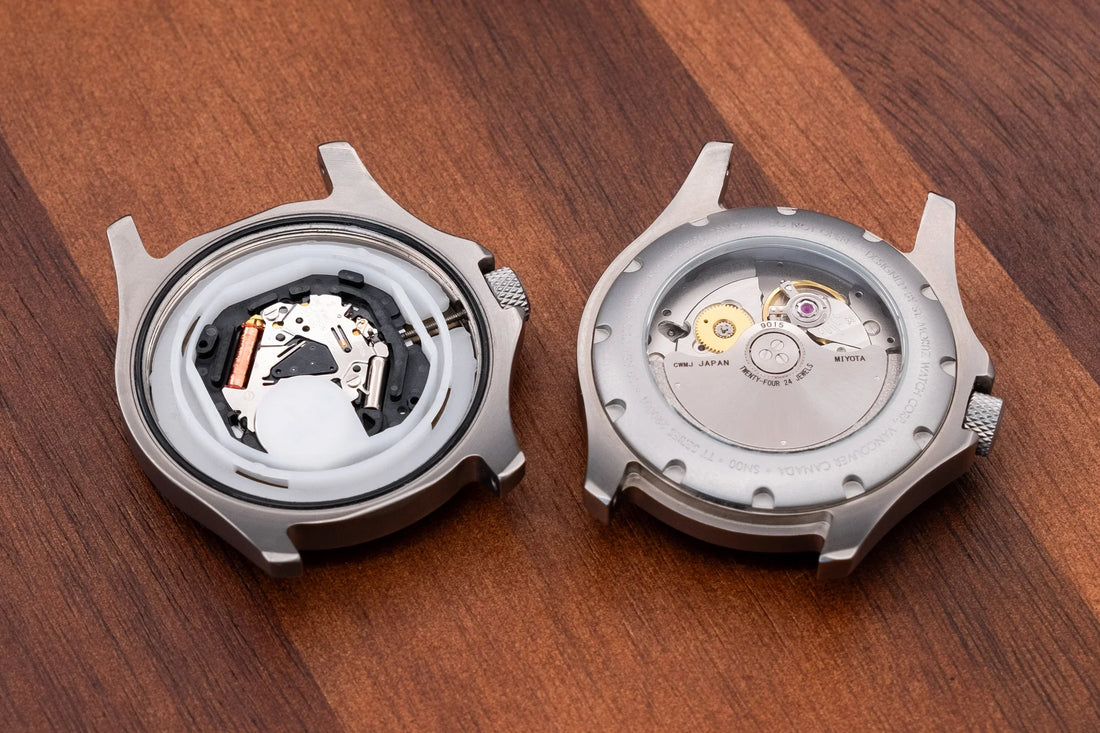
Quartz, Solar, or Mechanical? Choosing the Right Watch for You
Share
Finding the Right Movement for You
When choosing a watch, one of the biggest decisions is selecting the right movement for your lifestyle. While all watches keep time, the movement inside affects how they function, their maintenance needs, and even their feel on the wrist.
We don’t believe one movement is better than another. Instead, each has its own strengths, and the best choice depends on what fits you best. Let’s break them down.
What is a Watch Movement?
A watch movement—often called the "engine" of the watch—is what keeps time and moves the hands. The three main types are:
✔ Quartz – Battery-powered and highly accurate
✔ Solar – Light-powered with eco-friendly benefits
✔ Mechanical – Traditional craftsmanship powered by gears and springs
Down below is how they compare ⬇️
Quartz Movement – Reliable & Low Maintenance
How It Works
Quartz watches run on a battery-powered movement that sends an electric current through a tiny quartz crystal, making it vibrate at a steady frequency. This keeps the watch incredibly accurate.
Why Choose Quartz?
✅ Ultra-Accurate – Loses just a few seconds per month
✅ Low Maintenance – No winding, just an occasional battery change
✅ Affordable – More budget-friendly than mechanical watches
Things to Consider
⚠ Battery Changes – Typically every 2-3 years
⚠ Lacks Traditional Appeal – Some collectors prefer mechanical movements
Best For
If you want a dependable, no-fuss watch that’s perfect for daily wear, quartz is a solid choice. It’s ideal for those who want to set it and forget it without worrying about winding or maintenance.
Solar Movement – Sustainable & Long-Lasting
How It Works
Solar watches use a light-powered battery, converting energy from the sun (or any light source) into electricity. This energy is stored in a rechargeable battery, eliminating the need for frequent replacements.
Why Choose Solar?
✅ Eco-Friendly – Reduces waste by eliminating battery swaps
✅ Reliable – Stays charged for up to 6 months even in total darkness
✅ Low Maintenance – Similar to quartz but without battery changes
Things to Consider
⚠ Initial Charge Time – May take a few hours to fully charge
⚠ Light Dependency – Needs occasional exposure to light to stay powered
Best For
Perfect for outdoor enthusiasts and eco-conscious buyers who want a maintenance-free watch.
Mechanical Movement – Classic Craftsmanship
How It Works
Mechanical watches don’t use batteries. Instead, they rely on a wound mainspring that releases energy through a series of gears. There are two types:
- Automatic – Winds itself through your wrist movements
- Manual – Requires regular hand-winding
Why Choose Mechanical?
✅ Craftsmanship & Heritage – A true work of watchmaking art
✅ Long-Lasting – Can last generations with proper care
✅ No Batteries Needed – Runs purely on mechanics
Things to Consider
⚠ Requires Maintenance – Needs occasional servicing
⚠ Less Accurate – Can lose or gain a few seconds per day
⚠ Limited Power Reserve – Stops if not worn or wound for 40+ hours
Best For
If you love the history and craftsmanship of watches, a mechanical timepiece connects you to the artistry of traditional watchmaking.
Which Movement is Right for You?
✔ Want precision and zero maintenance? → Go Quartz
✔ Want sustainability and long battery life? → Go Solar
✔ Want tradition and craftsmanship? → Go Mechanical
At Anova Chicago, every watch we make is built to last—featuring a 2-year warranty. No matter which movement you choose, you’re investing in quality, durability, and timeless style.
